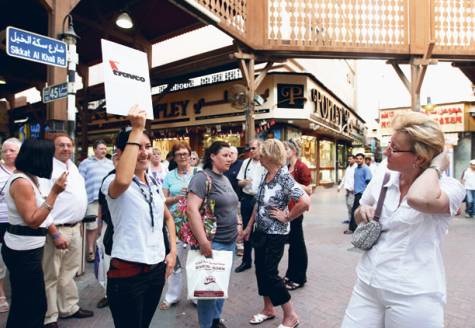 Business & Finance Club - Dubai: When hit by a recession, "the first thing people reduce is their travel expenses", said Gassan Aridi, CEO of Alpha Tours, a large inbound tourist operator in Dubai.
But today, two years after the global financial crisis, the tourism sector has weathered the storm, and is looking forward to being more profitable.
Aridi said that as some countries have come out of the recession, reservations for 2011 are very good. "So things are not back to normal, but they are improving," he said.
Aridi said Dubai is currently being marketed as an "affordable luxury destination".
"People are travelling for entertainment and comfort — a nice hotel, good food, a spa, a shopping. This is what people are looking for and Dubai has this," he said. "It's an asset that will help the industry pick up again."
"Prices have decreased by almost 40 per cent" because of the slowdown and because of the new hotel rooms coming into the market, he said.
Saturation
According to Naeem Darkazally, director of sales and marketing of Rotana Dubai & Northern Emirates, the challenges that face the hospitality sector today are not only those related to the recession, but are also because of the increase in the supply.
"In five years or less, we will be seeing pretty much a big supply coming in if all the projects go through and which will saturate the market," he said.
When the slowdown hit in 2008-2009, Rotana's revenues dropped by 25 per cent. By the end of this year the hotel chain company is expecting flat growth in their business. "At least, the worst has passed." However, Rotana is currently looking at venturing into new markets such as China, Ukraine, South Africa and India, with plans to open offices in Shanghai and Moscow. "We decided to go to places we haven't been to before and markets we used to shy away from because of budget limitations," he said. "These markets have mass tourism."
Locally, Rotana is focused on running attractive promotions and opening three-star hotels, which are naturally cheaper. It currently runs two budget hotels under the brand name Centro, with a third being launched shortly at the end of this month. The hotel chain is aiming to have 25 Centros in operation by 2015 throughout different markets.
Ellen Montanari, a senior consultant at TRI Hospitality Consulting, told Gulf News that the situation has been different in Dubai than in Abu Dhabi.
While Dubai was hit by what happened to the real estate market, in Abu Dhabi the supply that came online is what has caused the drop in occupancy rates this year, she said. Montanari said that there's strong potential for Abu Dhabi to become a tourist attraction and not just a place for the high-end traveller. "They need to re-invent themselves," she said.
"This year Dubai started to stabilise a bit more. They changed strategy and moved to cheaper segments," she said. "The last six months have stabilised [for Dubai] and the rates haven't been falling as badly as they did before, but they are still under pressure."
While Sharjah had benefited in the past from being the cheaper option for those coming into Dubai, it now has no competitive advantage since the rates in Dubai have dropped, Montanari explained.
The market is expected to be stagnant for a while especially with all the new supply coming on the market. "The new supply that will come in the upcoming years will be staggering and the market will be struggling to absorb it," she said. |